#meta film
Explore tagged Tumblr posts
Text
On May 8, 1997, Scream debuted in Hong Kong.







#scream#wes craven#ghostface#slashers#slasher movies#90s slasher#slasher art#horror art#horror film#horror movies#horror#black comedy#satire#spoof comedy#meta film#meta horror#movie art#art#drawing#movie history#pop art#modern art#pop surrealism#cult movies#portrait#cult film
9 notes
·
View notes
Text










이렇게 하면 다 의미가 있어 보여
ART MUSEUM BY THE ZOO (1998) — dir. Lee Jeong-hyang
#미술관옆 동물원#art museum by the zoo#shim eun-ha#screenwriter: lee jeong-hyang#lee sung-jae#심은하#이성재#영화#kmovie#meta film#films about films#romcom#caps#*
1 note
·
View note
Text
regarding Dune Part 2: i am obsessed with its consistent visual theme of self-destruction. the shot of paul surrounded by his new followers seems triumphant - until the viewer remembers that each crysknife is made from a tooth of shai-hulud, and paul is standing in a circle of them, in the allegorical mouth of the worm. he orders a missile strike, and the viewer sees them fly directly through his head. every victory for the prophecy is a blow to paul himself; he's killing himself with every step he takes towards his destiny, and we know that already, and the film is screaming it, but it's a hell of a thing to watch it happen, isn't it?..
#dune#dune part 2#dune 2024#paul atreides#kwisatz haderach#shai hulud#dune 2#dune meta#film analysis#visual metaphors
6K notes
·
View notes
Text
“All those years wasted fighting each other, Charles … to have a precious few of them back …” is one of THE most romantic lines in movie history and I don’t get how anybody can possibly be blind to their being in love when these are canonical words, spoken in the most passionate and profound delivery by Sir Ian McKellen (the LONGING in his voice, you guys), followed by Sir Patrick Stewart managing to convey a million different emotions without moving a single facial muscle in the reaction shots, and then a closeup of their hands perfectly fitting together like puzzle pieces. This is some Wuthering Heights-level yearning; it ain’t subtle. I’ve heard some people say this doesn’t really count as an apology, and those people have zero media literacy; this is an even MORE powerful statement than either “I’m sorry” or “I love you” could ever be. It’s the echo of the theme of “Time in a Bottle,” which not so coincidentally earlier played in the scene where the two of them are saved from a brutal death by their son in the past. It’s a perfect summary of the entire tragedy and beauty of their relationship.
#xmcu#xmdofp#cherik#x men#x men days of future past#x men movies#x men films#cherik meta#dofp#fox xmen#mutants#magneto#professor x#charles xavier#erik lehnsherr#magneto x professor x#erik x charles#magneto xmen#sir ian mckellen#sir patrick stewart#time in a bottle#peter maximoff#quicksilver#charles x erik#erik lensherr x charles xavier#charles xavier x erik lehnsherr#days of future past#xmen magneto#professor charles xavier#the great cherik revival of 2024
906 notes
·
View notes
Text
Disney's unconventional "Cinderella" (1950) (long)
Having watched most of the many adaptations of Cinderella, I've come to realize what a unique adaptation Disney's 1950 animated classic really is. Unlike Snow White, which only had a few stage and screen adaptations before Disney produced its groundbreaking film, Cinderella had already been adapted many times before Disney's turn came, and Disney's version makes a surprising number of departures from the standard Cinderella "formula." It was definitely a fresh, creative Cinderella when it made its debut, and it arguably still is. Yet because it's become so familiar in pop culture, and today so often serves as our childhood introduction to the tale, it's easy to overlook its inventive storytelling choices. The 2015 live action remake uses several classic Cinderella adaptation tropes that the original 1950 film actually subverts!
Here's a list of the often-overlooked ways in which Disney's Cinderella stands out from earlier adaptations, and from many later ones too.
Cinderella herself. Disney's Cinderella isn't a traditional Cinderella in personality. The "traditional" portrayal of Cinderella, seen in virtually every adaptation before Disney's and several afterwards too, is the portrayal I call "The Waif": a very young, fragile, melancholy girl, dressed in pathetic rags and smudged with ashes, who makes the audience want to rescue her and who wins the Prince's heart with her wide-eyed innocence and artless charm. But whether chiefly to set her apart from earlier screen Cinderellas or from Disney's earlier delicate ingenue Snow White, Disney's Cinderella is none of those things. She comes across as older, or at least more sophisticated. Nor is she waif-like, but instead combines down-to-earth warmth with ladylike dignity, even at her lowliest. She doesn't sit in the ashes ("Cinderella" is her real name in this version), and her servants' dress is humble yet clean and only slightly tattered. She's gentle and kind, yes, but also intelligent, practical, playful, sometimes sarcastic, philosophical, optimistic, genuinely cheerful when she's with her animal friends, and yet angrier and stronger-willed than virtually all earlier Cinderellas. She doesn't beg to go to the ball, but asserts her right to go, and then sets to work fixing up an old dress of her mother's for herself. Only her stepfamily's sabotage, first by keeping her too busy to finish the dress, and then by destroying it after the mice and birds finish it for her, prevents her from taking herself to the ball without a Fairy Godmother. To this day, she stands out as a complex, unique Cinderella, which pop culture too often forgets.
Lady Tremaine. Some critics today complain that Disney makes Cinderella's stepmother a total monster instead of giving her "nuance" and call her portrayal "sexist." But can't we agree that her sheer cruelty enhances the film's dramatic power? And compared to earlier portrayals of Cinderella's Stepmother, it definitely makes her stand out. In most pre-Disney Cinderellas and many after, the Stepmother is a pompous, vain comic antagonist. Once again, Disney was innovative by portraying Lady Tremaine as a dignified, manipulative, and truly sinister villain, who takes quietly sadistic pleasure in abusing Cinderella and will stop at nothing to prevent her from going to the ball or marrying the Prince. As far as I know, she's also the first Stepmother to realize before the slipper-fitting that Cinderella was the lady at the ball and to take action to prevent her from being found. That's a commonplace plot device in more recent adaptations, but in 1950 it was a creative twist!
The mice and other animals. Viewers debate whether Cinderella's mouse friends, Jaq, Gus, et al, and their misadventures evading Lucifer the Cat are a welcome addition or take away too much screen time from Cinderella herself. But there's no denying that the presence of the mice and birds is an inventive storytelling choice, which makes Disney's Cinderella stand out! And I can provide a long list of reasons why they're more than just "filler." (1) They add liveliness, humor, and appeal for younger children. (2) They gave the animators an outlet for the type of character animation they did best, rather than binding them to the harder work of animating realistic humans. (3) They give Cinderella someone to talk to besides her stepfamily. (4) They give her a way to demonstrate her kindness. (5) The struggles of the mice with Lucifer parallel Cinderella's abuse by her stepfamily, and Cinderella's undying optimism not only keeps her from despair, but inspires them too. (6) They arguably provide a further reason why Cinderella stays with her stepfamily – not only does she have nowhere to go, but an entire community of small sentient creatures relies on her for food and protection. (7) They reward Cinderella for her kindness. From the start, her friendship with the mice and birds makes her life easier to bear, both by easing her loneliness and because they do helpful deeds for her, like mending and cleaning her clothes. They fix up her mother's dress for her to wear to the ball – only the stepfamily's last-minute cruelty requires the Fairy Godmother to step in. And in the end, they're directly responsible for Cinderella's happy ending by freeing her from her locked room. They do all these things because Cinderella has protected them, fed them, made them clothes, and been their friend. Therefore, Cinderella's good fortune never feels "just handed" to her: her kindness directly earns it.
The Fairy Godmother. It's always varied between illustrators whether Cinderella's Fairy Godmother is portrayed as a grandmotherly old woman or as youthful, regal, and beautiful, but screen and stage adaptations before the Disney version virtually always took the "youthful, regal, beautiful" approach. That is, when they didn't change her into a wise, fatherly male magician-advisor, as in several opera adaptations! At any rate, seriousness and dignity were the norm for this character in most adaptations from the 19th century through the 1940s. Making her a sweet, comforting, grandmotherly figure, with a comically and adorably absent mind, was another of Disney's fresh choices.
Cinderella's entrance at the ball. We all know the classic image of Cinderella's entrance from other adaptations. Cinderella appears at the top of the grand staircase that leads down to the ballroom, and a hush falls over the assembly, as not only the Prince, but all the guests and members of the court are amazed by the unknown lady's beauty and magnificent dress. Even in versions without a staircase, Cinderella captivates the room the moment she enters. Adaptations both before and after Disney's, including Disney's own 2015 live action remake, play her entrance this way. But the 1950 animated classic subverts it! The grand staircase leads up to the ballroom, not down to it, and Cinderella's entrance isn't a triumph at first, but a vulnerable moment as she makes her way up the stairs alone, dwarfed by the splendor around her. Then, when she reaches the ballroom, no one notices her at first, because the other ladies are being presented to the Prince and all eyes are on him. But then the Prince notices her in the shadowy background as she quietly marvels at her surroundings, and leaves his post to approach her and invite her to dance. Only then does the rest of the assembly notice her, because she's the one the Prince has singled out. It's more understated and it feels more realistic than the traditional entrance, as well as more clearly symbolic of Cinderella's venturing above her station, then both literally and figuratively being led out of the shadows by the Prince's unexpected attention.
The slipper-fitting plan. Over the years, it's been fairly popular to mock the idea of using the glass slipper to find the Prince's love, as if there were no chance it would fit anyone else. Disney's version is creative by having the slipper-fitting search be the comical, hot-blooded King's idea, not the Prince's, and making it clear that it's not, nor is it meant to be, a foolproof plan to find Cinderella. The Duke points out that the slipper could fit any number of girls, but the King doesn't care if they find the right girl or not: he just wants to hold his son to his pledge to marry "the girl who fits this slipper" and force him to marry the first one who fits it. This also means that Disney doesn't do what most adaptations do and have the Prince conduct the search himself, but follows the original Perrault tale by having a gentleman, in this case the Grand Duke, do it instead. This prevents audiences from mocking the Prince for relying on the slipper instead of knowing his beloved's face.
Cinderella breaking free and asking to try on the slipper. Even though in Perrault's original tale, Cinderella asks to try on the slipper, she almost never does in adaptations. In most versions other than Disney's, including Disney's own 2015 remake, Cinderella's presence in the house (and/or the fact that she has the other slipper) is either discovered by accident or revealed by Cinderella's allies, not by Cinderella's own initiative. In some versions, she even tries to hide from the Prince and/or the search party, either out of fear of her stepfamily or because she feels unworthy of the Prince in her rags. But not Disney's animated Cinderella! First of all, she has an assertive emotional breakthrough when she calls on her dog Bruno to chase Lucifer away and free Gus to slip her the key to her locked room. Earlier on, she urges Bruno to try to get along with Lucifer, lest the stepfamily not allow him to sleep in the house – it's clear that Bruno represents her own rebellious side, and in that scene she's really talking about herself, revealing that she tolerates her stepfamily's abuse so she won't lose her own "nice warm bed" and be homeless. But in the climactic scene, when she finally sees a way out, she gives up playing nice and seizes her chance. First she unleashes Bruno on Lucifer, and then she runs downstairs and directly asks to try on the slipper, not caring how her stepfamily will react, or what the Grand Duke will think of her shabby dress, or whether the audience will accuse her of gold-digging or not. This isn't a common breakthrough in other Cinderella adaptations, but it fits perfectly (like a glass slipper, you might say) with the Disney Cinderella's stronger-willed and more self-assured characterization.
"I have the other slipper." We can probably all safely assume that when audiences first saw Disney's Cinderella in 1950, they all expected Cinderella to try on the glass slipper she lost, with her identity revealed by its perfect fit. They never would have expected Lady Tremaine to trip the footman and break the glass slipper... only for Cinderella to calmly reveal that she has the other one. It's yet another clever and unexpected twist, not seen in any other version. Not even Disney's own 2015 remake.
Disney's Cinderella deserves far more credit than it gets for being unique among the myriad versions of the tale, especially compared to the versions that came before it.
5K notes
·
View notes
Photo

SEDMI FESTIVAL META FILMA u Art bioskopu Kolarac
Sedmo izdanje Festivala meta filma biće održano od 15. do 17. decembra u Art bioskopu Kolarac, a u okviru ovogodišnjeg festivala biće prikazan i novi film francuskog reditelja Fransoa Ozona.
Festival otvara film Filipa Čolovića "Potreba za mržnjom" nakon čega će publika moći da pogleda "Baksuzni seks ili luda pornografija" čiji je autor rumunski reditelj Radu Žude.
Drugog dana festivala biće prikazan domaći film "Okupirani bioskop" Senke Domanović, a potom i novi film Fransoa Ozona "Peter fon Kant".
Trećeg, završnog dana festivala biće dodeljena nagrada "Branko Vučićević", posvećena sećanju na izuzetnog autora i prevodioca, tvorca pojma "srpska montaža", koji je svojim scenarističkim i kritičarskim opusom dao dragocen doprinos razvoju ovdašnjeg meta filma.
U meta filmovima akteri jasno ukazuju da je ono što gledamo proizvod fikcije, a to su ujedno i filmovi koji govore o filmovima - o procesu njihove pripreme i snimanja. U njima se koriste video materijali različitog porekla poput kućnih filmova, televizijskih snimaka i eksperimentalnih filmova. S druge strane, meta filmovi su česta pojava i u prestižnoj holivudskoj produkcji.
#film#festivalmetafilma#artbioskopkolarac#kolarac#filmovi#beograd#kultura#kolarčeva zadužbina#festival#filip čolović#reditelji#bioskop#montaža#meta film
0 notes
Text
okay so i was thinking in the tags of this post about how tony gets so much immediate incredulous pushback when he says he doesn't want to make weapons anymore
specifically that i got some Untraceable Vibe TM that maybe tony had tried before to branch out into other things and was repeatedly gently shepherded back to military projects by a miserable pinky-ringed hand. and then i thought. hang on






this is the same fucking line it's the same argument it's the same conversation
and it made me think back to that talk with my bestie christine everhart and how it has a Structure it's a Fight tony's playing Chess about it. He starts with the obie line:



when that doesn't work, he goes for howard's:



and when that doesn't work, off comes the sunglasses armour, and it's just Tony—




and. ah. a Traceable Vibe TM, actually,
#kayvsim12024#i'm normal i promise i'm reading into this film a normal amount i do not have conspiracy boards on my walls i am fine even#why am i writing im1 meta in 2024? i'm worried
460 notes
·
View notes
Text
okay so idk what meta is but listen THE DIRECTION ON DEAD BOY DETECTIVES IS FUCKING SUPERB. UNRIVALLED. AND I NEED TO TALK ABOUT IT TO THE HELLSITE VOID. SO LISTEN.
transitions. between scenes. it's so easy to cross-fade, or just hard cut, or fade to black and then open the next scene. sometimes, if a piece of media is putting in a bit of effort, you'll see things like water transitioning to sky or maybe a background being continuous while the characters change or vice versa.
but dead boy detectives. the transitions are fucking flawless. and so creative, like everything about this show. creative transitions are difficult to do, and they keep getting it right. whether it's someone holding up a circle and that melds into the next scene where the railing has a circle in it, or the camera moving downwards from the floor in one location to under a table in a different location, or them falling out of mirrors, they take the tiniest of elements and turn them into transitions so fucking deliciously, and everything is so dynamic, both the camera and the scene.
and that makes it so much more impactful when there IS a hard cut. like in episode 5 (where the You Know What occurs with Jenny). the cut from the mascot at the high school scene to the butcher's shop is BRUTALLY hard, with Jenny again slicing into things with her meat cleaver, and it lends an extra air of violence to that meat cleaver--which is such great foreshadowing for what happens later (even the initial establishing shot of the butcher's shop at the start of the episode makes the cleaver in the sign flash red, drawing attention to it).
the direction helps the narrative so much, giving both atmosphere and foreshadowing without needing to fatten the dialogue with it.
and apart from all that just the general camerawork is so creative and helps with the campy feel of the show, with characters being bang in the middle of frames or with the camera holding a lovely shot for longer than a beat like Edwin and Niko cocking their heads to the side it's all such a lovely, choreographed dance between the camera, the actors, the set and the script and NGKKK.
#dbda#dbdshow#dead boy detective agency#dead boy detectives netflix#dbda meta#dead boy detectives#camera work#film and tv transitions#foreshadowing#weirdly specific but ok#asmi
619 notes
·
View notes
Text
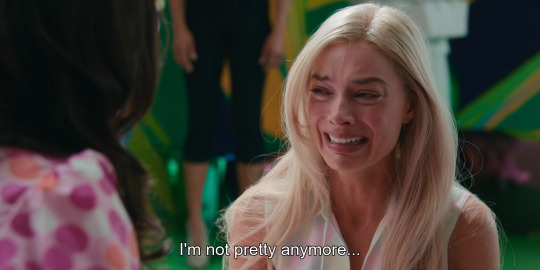
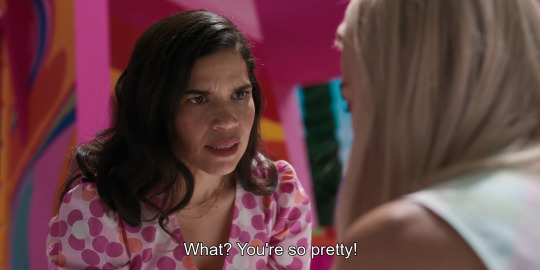

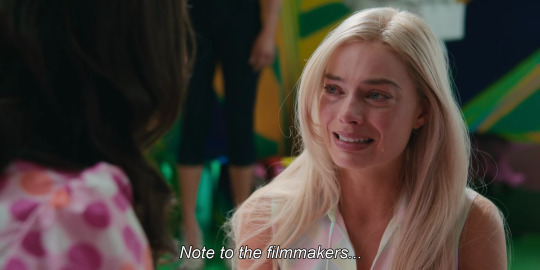
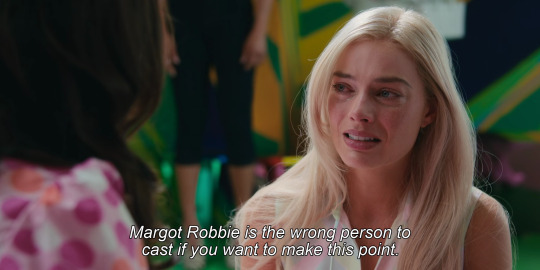
Barbie (2023)
3K notes
·
View notes
Note
I'm so tired of people saying that the Prince from Snow White is a creep for kissing Snow White when he thought she was dead.
People act as if he put his tongue down her throat while she looks like a regular corpse.
Maybe I'm just more comfortable with death because of my upbringing.
There's a European tradition that you would kiss dead people goodbye. You would also wait with a dying person because dying alone was one of the most horrible ways to die.
In Poland, you would spend three days with the dead body of your relative in the house so family and friends have time to say goodbyes. We even have pictures of family members in coffins, so we could remember them.
Yeah, it's a very post-modern, historically, culturally-small-minded way to look at it.
Specifically in this movie (which is a fairy tale's fairy tale) people just...totally ignore the scene where The Prince is introduced.
Seriously and truthfully, BECAUSE the Prince only takes action in three scenes of the movie, you HAVE to take all three of them very very seriously. Because thats all there is to know about him. That's how fairy tales work: lots of information hiding under very brief, simple snippets of information. It's called nuance.
Anyway.
The Prince kisses Snow White as a culmination of their promised love for each other.
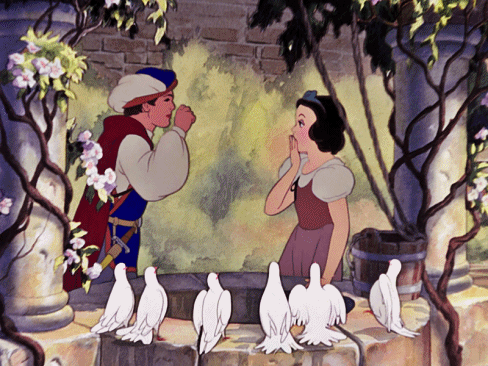
First scene he's in, he falls in love with her because of her obvious purity and he overhears her longing for someone to love her. Then she runs away because she's not sure of him, and doesn't know him. But he sings his part of the song, which is all about how he has just one heart to give, one devotion to spend, and he's choosing to give it and spend it on her if she'll have him.
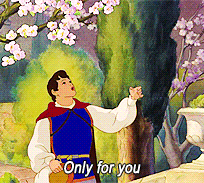
And she will have him. How do we know? She sends a kiss to him on the dove. That's how the exchange ends; that's how she responds, and that's why he leaves satisfied. It's their engagement scene. They're promising their hearts to each other.
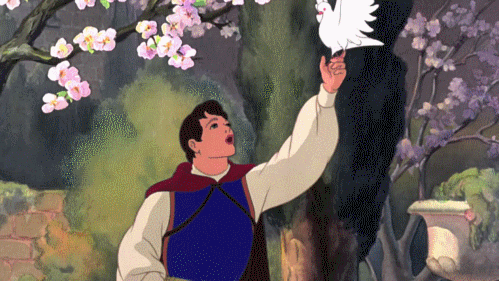
Fast-forward, the Queen messes up what might have been the natural follow-through of that engagement which is marriage by trying to kill Snow White, she's living in the woods, but she won't forget the Prince and wholeheartedly believes he'll come find her.
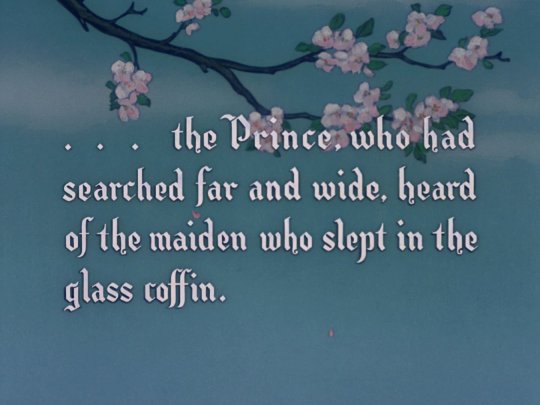
And the very next thing we hear about him is that he keeps his promise. He's got one heart, one love, one devotion, and it's promised to Snow White, and he will not stop searching for her. When he finds her, he's returning her kiss from their engagement scene. He thinks she's dead, but he has to finish his quest anyway. This is him, trying to keep his promise even if she's dead; he's trying to fulfill the exchange they had when they saw each other last.
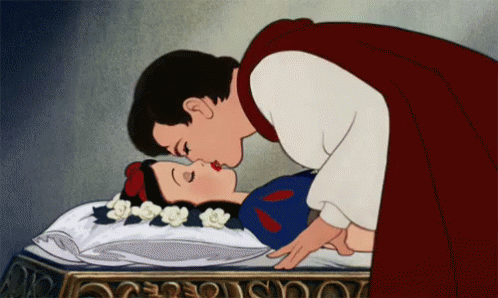
It's ridiculous to assume that she needed to be awake and alive to give permission for him to kiss her; it's ignorant of the whole relationship, symbolic and literal, between these two fairy tale characters. She already sent him her kiss and her heart; he already promised to claim it; he's fulfilling the promise in that scene.
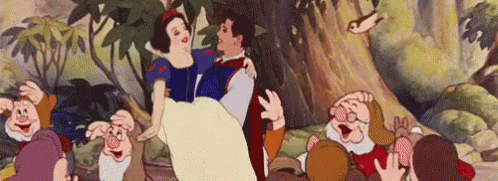
Crazy postmodern people, don't know how to take in a story. Not everything gets to have your socio-cultural lens imposed upon it.
#Snow White and the seven dwarves#little graphic there#asked#answered#true love's kiss#discourse#Snow White.Snow White 2024#Snow White hate#Snow White and the seven dwarves 1937#snow white 1937#disney#classic films#meta#analysis#fairy tales#learn to read fairy tales
2K notes
·
View notes
Text
soap's whole deal being sniper and demolitions gets me going bc on the surface they sound so different but when you get into it, you realise it's bc soap's smart
sniping is all math; calculating distances and wind interference and bullet drop. something i think people overlook is he was listed as a sniper first so it can be implied that he's better at it than demolitions. he does more sniping in both campaigns than demolitions work; in capture or kill, ghost specifically calls on him to take down the aq snipers
and demolitions is math with a hit of chemistry; knowing what mixes with what, knowing how much to use, recognising environmental factors and adjusting accordingly. it's not just about the boom; so much work goes into contained/ planned explosions. especially when having enough power for a breacher charge and not bringing down the whole building is the difference between mission success and failure
the chemical bombs he makes in alone can't just be any old cleaners, they have to have the correct reaction to each other; he just knew off the top of his head what would mix with what to create what reaction. he would also potentially have to recognise them by sight/smell bc they would’ve been written in spanish
soap would also have to know architecture; recognising structural integrity and weak points so he knows exactly where to plant a charge to bring it down and how it'll come down
he has an incredible soldier's mind people just forget that bc he's sociable which itself is a skill
we know he tends to buck against orders he doesn't agree with like when he pushes back against ghost in capture or kill and shepherd when he tells them to release hassan
he gets closer to people and sees if he can trust them and that's when he follows them without question. really think about how he talks to alejandro and rudy; he asks about their home and alejandro's family and rudy's relationship with him. those aren't questions you ask a stranger after a few hours of knowing them. that's not even touching on his relationship with ghost
he also deliberately brings people of higher ranks down to his level; talking informally with ghost and giving him a shoulder punch, addressing alejandro (a colonel!!) by his first name and rudy by his nickname despite literally just meeting them. he personalises all of them and it’s in direct opposition to the reason most characters do that; it’s not due to insubordination or lack of respect, the more he respects and trusts someone, the more casual he is with them
he digs into people; he wants to know what makes them tick and that determines if he can one, trust them and two, follow their orders. once he decides that, he's the ultimate soldier; he bleeds loyalty which makes him vicious when that loyalty is taken for granted
he isn't naive or bubbly or insecure; he's an incredibly smart and aware soldier. he's aggressive and bloodthirsty and loyal and intuitive and i love him so much
#i cant believe i never posted the soap meta that got me twitter famous™️💅#as with damn near every piece of characterisation in this franchise soaps is only apparent in subtext and connecting tiny little dots#it is very easy to just pick up his surface personality and think thats all he is#but soaps not a sunshine character#hes not super friendly or bright#hes just willing to talk to people and hes paired up with ghost who never wants to start a conversation#every time i see soap presented as this bubbly airhead thats super sweet and just blows stuff up i lose a year off my life#and i dont blame people for getting this vibe from him but im begging you to look a lil deeper#this isnt getting into his anger or the fact that he is a soldier which automatically makes him a wee bit fucked up#like he is hyperviolent and takes joy in it#we all know ghosts snuff film joke but soaps the one who responds positively to it#he returns the joke and only calls him out on it when he says he wont watch it more than once and even then its teasing not grossed out#and if we take the ‘he tried to join the military at 16’ factoid from 09 as current canon then he very easily could have a rough home life#no one tries to repeatedly join the military early without having some kind of problems#soap knows his worth and his abilities you dont get to be as good and specialised as he is without being completely sure of yourself#we know ghost has an ego but soap constantly butts up against it with his own affirmations#‘you wanna be better than me johnny’ ‘maybe i already am/i will be’ ‘a little helps not so bad eh lt’#being a sniper makes me hate the ‘cant sit still’ hc hes literally an sas sniper he wouldnt be complaining after a few hours of overwatch#i like the adhd hc and maybe he fidgets in his day to day life but the second hes at work hes At Work#tldr soap could be just as complex a character as ghost if cod would stop treating their campaigns as an afterthought and actually commit#coming out of my cage and ive been doing just fine.txt#we’re a team. ghost team#talk meta to me#john soap mactavish#soap cod#cod mw2#soapghost#save post#call of duty modern warfare#cod meta
589 notes
·
View notes
Text
On February 14, 2003, Adaptation debuted in the United States, Canada, and Denmark.

Here's some new Nicolas Cage art!
#adaptation#charlie kaufman#spike jonze#nicolas cage#comedy drama#meta fiction#meta film#satire#films about filmmaking#the orchid theif#black comedy#self reflexive film#susan orlean#movie art#art#drawing#movie history#pop art#modern art#pop surrealism#cult movies#portrait#cult film
1 note
·
View note
Text
half baked thought bc I’m actually chewing drywall abt this trailer rn but I’m really interested to see if and how bachelor route leans into film as the vessel for performance rather than theatre- I think it’s a fascinating narrative shift that really articulates the difference between the haruspex and bachelor routes. “any choice is right as long as it’s willed” really reflects the ever changing and in-the-moment presence of live theatre whereas with “there is only one truth,” the film has been made. the events have already come to pass. they are preserved in time ad infinitum. which also adds to the tragedy of daniil dankovsky i think :)) idk i just think its Neat and i am so so incredibly excited about this game cannot wait to see the sillies again :))
#pathologic#daniil dankovsky#carissa speaks#meta post#I hope this makes sense lmao#I also hope that even if we lean more film vs theatre we still get some fucked up performances from mark and crew#the theatrical aspects are truly one of my favorite parts of patho 2 and I will miss them if we move away from it#I do think that the way death works and presents itself in this one will be different than artemy’s route#which I’m really excited about#cannot wait for fun steppe vacation part 2 electric boogaloo
331 notes
·
View notes
Text
Are we ever going to talk about how in GO!god's favourite film:
the protagonist is told it's okay to abandon her religious calling to pursue romantic love
the family flee the country so the father isn't forced to serve in forces that are obviously evil?
Yes? No? All right then.
#good omens#good omens meta#the sound of music#why does Aziraphale hate that film so much?#honestly I thought it was quite lovely#pity the rest of heaven didn't seem to get the message#despite knowing it well enough to bloody quote from it#climb every mountain ford every stream#Crowley got it right though
299 notes
·
View notes
Text
The fact that all of Erik’s greatest fears about humanity’s response to mutantkind come true in the dark Sentinel future, and yet when he and Charles end up cornered about to die while waiting for the timeline to be changed, rather than express hope that mutants will have better lives in the new timeline, Erik’s last words instead express hope that he will have more time with Charles.
The fact that in his last moments, more time with Charles is what Erik wants most, even more than peace for mutantkind.
The fact that he admits all those years without Charles were a waste, that his life was wasted because he chose to spend it away from Charles.
The fact that having a life with Charles is the possibility that makes everything worth it for him, even more so than this new hope for his kind.
The fact that he ensures Charles knows that if he could save time in a bottle, the first thing he’d like to do is save every day till eternity passes away just to spend them with his beloved telepath…
#xmcu#cherik#cherik meta#xmdofp#erik lehnsherr#charles xavier#x men#x men days of future past#magneto#professor x#magneto x professor x#erik x charles#erik/charles#charles/erik#days of future past#x men movies#x men films#erik lensherr x charles xavier#x men dofp#sentinels#dofp#charles xavier x erik lehnsherr#time in a bottle#professor charles xavier#xmen meta#mutants#fox xmen#the great cherik revival of 2024
1K notes
·
View notes
Text

AKHENATEN
uhhh let's see. I combined some sketches I did of Nefertiti and Akhenaten and ended up somewhere here for an Akhenaten design. in my heart, it's for a comic but there's so much visual research I'd have to do before I could even think about approaching a comic. oof.
anyway moving on: Akhenaten was a childhood obsession! and then I moved onto other things, as one does, but then a couple months ago I decided to check out some books and now I have a headache.
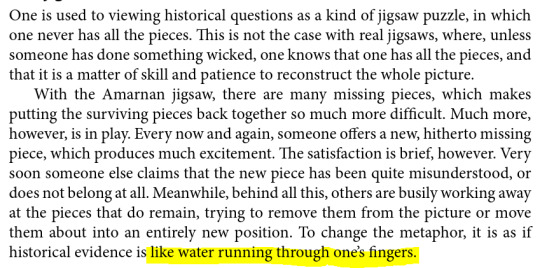

Akhenaten, Ronald T. Ridley
#i did outline my ideal high stakes political drama set during this particular dynasty focusing on akhenaten tho#all these historians have been just. straight up saying things about this guy for centuries and while some of it is absolute nonsense#some of the other stuff makes for EXCELLENT political thriller material#especially with the wider table of factions at play like yeah baby i see your father's policy style. i see you. i know what soundtrack#this kind of scene should have#ancient egypt tag#GOD there was a sword and sandals film that had their set design take notes from ancient egypt over ancient greece#and it was SUCH a cool meta narrative esp when you consider Egypt's impact on all the Mediterranean empires#like yes YES if the roman sword and sandal movies had a spine they'd do it too
250 notes
·
View notes